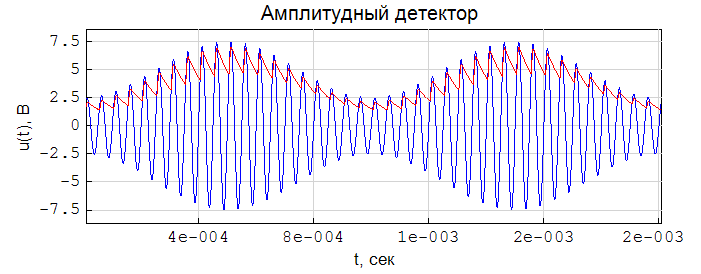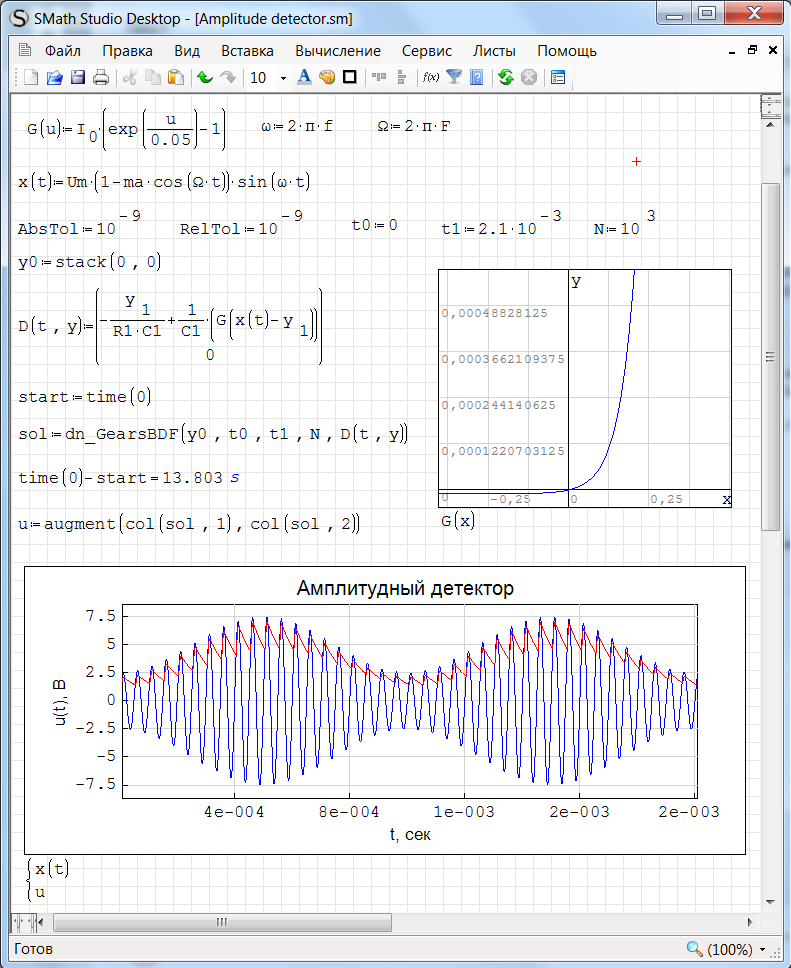Обзор доступных библиотек для численного решения жёстких ОДУ
 Создавая дополнения к отечественной математической программе SMath Studio, я нашёл в сети ряд библиотек, которые можно было бы использовать в своих программах. Предлагаю небольшой их обзор.Стандартный RK45 с фиксированным шагом может помочь в большинстве случаев, но бывают задачи, где этого недостаточно. Для решения жёстких систем были придуманы специальные решатели, которые мы и рассмотрим с точки зрения их практического использования.
Создавая дополнения к отечественной математической программе SMath Studio, я нашёл в сети ряд библиотек, которые можно было бы использовать в своих программах. Предлагаю небольшой их обзор.Стандартный RK45 с фиксированным шагом может помочь в большинстве случаев, но бывают задачи, где этого недостаточно. Для решения жёстких систем были придуманы специальные решатели, которые мы и рассмотрим с точки зрения их практического использования.
Большинство представленных ниже функций, если не оговорено особо, можно привести к одному формату вызова (по аналогии с Mathcad):
ode_solver (init, x1, x2, intvls, D (t, x)) где: init — вектор начальных условий, (x1, x2) — отрезок интегрирования, intvls — количество интервалов на отрезке, D (t, x) — система ОДУ. 1. Intel ODE Solvers Library Содержит следующие функции: rkm9st (), mk52lfn (), mk52lfa (), rkm9mkn (), rkm9mka ().rkm9st () — a specialized routine for solving non-stiff and middle-stiff ODE systems using the explicit method, which is based on the 4th order Merson«s method and the 1st order multistage method of up to and including 9 stages with stability control. mk52lfn () — a specialized routine for solving stiff ODE systems using the implicit method based on L-stable (5,2)-method with the numerical Jacobi matrix, which is computed by the routine. mk52lfa () — a specialized routine for solving stiff ODE systems using the implicit method based on L-stable (5,2)-method with numerical or analytical computation of the Jacobi matrix. The user must provide a routine for this computation. rkm9mkn () — a specialized routine for solving ODE systems with a variable or a priori unknown stiffness; automatically chooses the explicit or implicit scheme in every step and computes the numerical Jacobi matrix when necessary. rkm9mka () — a specialized routine for solving ODE systems with a variable or a priori unknown stiffness; automatically chooses the explicit or implicit scheme in every step. The user must provide a routine for numerical or analytical computation of the Jacobi matrix. Библиотека написана на C со всеми вытекающими отсюда зависимостями. Доступны 32- и 64-разрядные версии библиотеки (libiode_ia32.lib и libiode_intel64.lib).intel_ode.h /******************************************************************************* ! INTEL CONFIDENTIAL ! Copyright© 2007–2008 Intel Corporation. All Rights Reserved. ! The source code contained or described herein and all documents related to ! the source code («Material») are owned by Intel Corporation or its suppliers ! or licensors. Title to the Material remains with Intel Corporation or its ! suppliers and licensors. The Material contains trade secrets and proprietary ! and confidential information of Intel or its suppliers and licensors. The ! Material is protected by worldwide copyright and trade secret laws and ! treaty provisions. No part of the Material may be used, copied, reproduced, ! modified, published, uploaded, posted, transmitted, distributed or disclosed ! in any way without Intel’s prior express written permission. ! No license under any patent, copyright, trade secret or other intellectual ! property right is granted to or conferred upon you by disclosure or delivery ! of the Materials, either expressly, by implication, inducement, estoppel or ! otherwise. Any license under such intellectual property rights must be ! express and approved by Intel in writing. ! !****************************************************************************** ! ! Header file for Intel® ODE Solvers ! !*******************************************************************************/
#ifndef _INTEL_ODE_H_ #define _INTEL_ODE_H_
#ifdef __cplusplus extern «C» { #endif /* __cplusplus */
void dodesol (int*, int*, double*, double*, double*, void*, void*,\ double*, double*, double*, double*, double*, int*, int*); void dodesol_rkm9st (int*, int*, double*, double*, double*, void*,\ double*, double*, double*, double*, double*, int*); void dodesol_mk52lfn (int*, int*, double*, double*, double*, void*,\ double*, double*, double*, double*, double*, int*, int*); void dodesol_mk52lfa (int*, int*, double*, double*, double*, void*, void*,\ double*, double*, double*, double*, double*, int*, int*); void dodesol_rkm9mkn (int*, int*, double*, double*, double*, void*,\ double*, double*, double*, double*, double*, int*, int*); void dodesol_rkm9mka (int*, int*, double*, double*, double*, void*, void*,\ double*, double*, double*, double*, double*, int*, int*);
#ifdef __cplusplus } #endif /* __cplusplus */
#endif /* _INTEL_ODE_H_ */ Дополнение ODE Solvers демонстрирует работу с этой библиотекой из c# кода.Ссылки:1. Intel® Ordinary Differential Equations Solver Library.2. Исходники дополнения ODESolvers.
2. GNU Scientific Library (GSL) Содержит следующие функции: gslrk2(), gslrk4(), gslrkf45(), gslrkck (), gslrk8pd (), rk1imp (), rk2imp (), rk4imp (), bsimp (), msadams (), msbdf ().Часть из них требует дополнительные параметры для работы (Якобиан). Те, которые мне удалось привести к общему виду:
Solvers for Non-Stiff Systems:
gslrk2() — explicit embedded Runge-Kutta (2, 3) method. gslrk4() — explicit 4th order (classical) Runge-Kutta. Error estimation is carried out by the step doubling method. gslrkf45() — explicit embedded Runge-Kutta-Fehlberg (4, 5) method. gslrkck () — explicit embedded Runge-Kutta Cash-Karp (4, 5) method. gslrk8pd () — explicit embedded Runge-Kutta Prince-Dormand (8, 9) method. Для работы с функциями используется универсальный интерфейс, где конкретный тип решателя задаёт шаговую функцию. Дополнение GNUScientificLibrary демонстрирует работу с этой библиотекой из c# кода.Не так просто сделать сборку библиотеки под Windows. Я использовал инструкцию с одного сайта, который сейчас недоступен. Тем не менее, в репозитории дополнения вы сможете найти 32- и 64-разрядные версии dll для GSL 1.16. Там находится вся библиотека, а не только решатели ОДУ.
Ссылки:1. GSL. Ordinary Differential Equations.2. Исходники дополнения GNUScientificLibrary.
3. Matlab C++ Math Library 2.1 (Win32) Да, вы можете использовать эту старую версию run-time библиотек для расчётов. Более того, она может быть установлена по относительным путям, т.е. можно просто положить содержимое оригинального дистрибутива (~28 Мб в развёрнутом виде) рядом со своей программой. Правда при вызове функций придётся использовать SetCurrentDirectory () с прямым указанием на место расположения «bin\win32». Я так делаю в своём дополнении.Содержит следующие функции: ode23(), ode45(), ode113(), ode15s (), ode23s ().
ode23() — solve nonstiff differential equations; low order method, ode45() — solve nonstiff differential equations; medium order method, ode113() — solve nonstiff differential equations; variable order method, ode15s () — solve stiff differential equations and DAEs; variable order method, ode23s () — solve stiff differential equations; low order method. Дополнение MatlabCppMathLibrary демонстрирует работу с этой библиотекой из c# кода.Ссылки:1. Ordinary Differential Equations.2. MATLAB C++ Math Library. User’s Guide. Version 2.1 (pdf).3. MATLAB C++ Math Library. Reference. Version 2 (pdf).4. Исходники дополнения MatlabCppMathLibrary.
4. Octave C++ Math Library (Win32) Примерно то же самое, что и Matlab C++ Math Library, но со своими тараканами. К сожалению, работу с этой библиотекой я одолел только частично. Дополнение OctaveCppMathLibrary демонстрирует работу с этой библиотекой из c# кода.Ссылки:1. Ordinary Differential Equations.2. Исходники дополнения OctaveCppMathLibrary.
5. DotNumerics Содержит следующие функции: AdamsMoulton (), ExplicitRK45(), ImplicitRK5(), GearsBDF (). Эта библиотека портирована для .Net с фортрана. Она понравилась мне больше всего. Работает достаточно быстро.Solvers for Non-Stiff Systems:
AdamsMoulton () — solves an initial-value problem for nonstiff ordinary differential equations using the Adams-Moulton method. ExplicitRK45() — solves an initial-value problem for nonstiff ordinary differential equations using the explicit Runge-Kutta method of order (4)5. Solvers for Stiff Systems: ImplicitRK5() — solves an initial-value problem for stiff ordinary differential equations using the implicit Runge-Kutta method of order 5. GearsBDF () — solves an initial-value problem for stiff ordinary differential equations using the Gear«s BDF method. Имеется много перегрузок для различных форматов вызова функций. Дополнение DotNumerics демонстрирует работу с этой библиотекой.Ссылки:1. DotNumerics.2. Исходники дополнения DotNumerics.
Как выглядит модель амплитудного детектора в SMath Studio при решении ОДУ с помощью функции GearsBDF ():
SMath Studio

